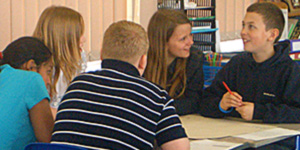
Project Introduction
Understanding the way dialogue is used as a prime tool for teaching and learning in classrooms is of international importance, and offers both practical benefits and insights into the ways people think collectively. Our collaborative project with Mexican colleagues aims to produce, evaluate, refine and disseminate a powerful coding framework that attempts to represent and operationalise commonalities amongst some key theorists in the field concerning productive forms of educational dialogue. The Cam-UNAM SEDA (Scheme for Educational Dialogue Analysis) tool builds on the previous work of the research team in this area and on that of other colleagues in the field. Its development is based on systematic analyses of video data of activity in UK and Mexican classrooms. It is intended to cover teacher-student and peer interactions in a wide variety of classroom settings and subject areas, including whole class and group work, across educational phases and settings with and without technology. The scheme has 33 codes which are clustered into 8 categories according to function of the acts and is used to highlight dialogic sequences within lessons. Development of specialised sub-schemes for technology use and peer dialogue, and an extensive tool for teachers, are underway.
The Faculty team members all belong to the Cambridge Educational Dialogue Research (CEDiR) Group; please see the group's website for details for related ongoing and recent work on dialogue across the Faculty and beyond.
Principal Investigators
Dr Sara Hennessy, Faculty of Education
Prof Sylvia Rojas-Drummond, National Autonomous University of Mexico
Other project team members
Faculty core team: Neil Mercer, Paul Warwick, Christine Howe, Rupert Higham, Rocio García Carrión, Fiona Maine, Ruth Kershner, Riikka Hofmann. Plus: Lisa Lee, Farah Ahmed, Annabel Amodia-Bidakowski, Elisa Calcagni, Maria Vrikki, Pablo Torres.
Mexico: Omar Torreblanca, Maricela Velez, Haydeé Pedraza, Guadalupe Vega, Nancy Mazón, Juan Manuel Fernández, Rosa María Ríos, Ana Maria Márquez, Nube Estrada, Flora Hernández, Kissy Guzmán, Mariana Alarcón, María José Barrera, Ana Laura Trigo, José Hernández, Jesica López, Yurieth Hernández
Funding
British Academy International Partnership and Mobility Scheme (ref. RG66509), 3 years (Jan 2013 - Dec 2015).
Cam-UNAM Scheme for Educational Dialogue Analysis (SEDA)
Full version of SEDA
Condensed version of SEDA
SEDA cluster scheme
Teacher SEDA scheme
Publications
Hennessy, S., Howe, C., Mercer, N., and Vrikki, M. (2020). Coding classroom dialogue: methodological considerations for researchers. Learning, Culture and Social Interaction, 25. https://doi.org/10.1016/j.lcsi.2020.100404.
Vrikki, M., Kershner, R., Calcagni, E., Hennessy, S., Lee, L., Estrada, N., Hernández, F., and Ahmed, F. (2018). The Teacher Scheme for Educational Dialogue Analysis (T-SEDA): Developing a research-based observation tool for supporting teacher inquiry into pupils' participation in classroom dialogue. International Journal of Research and Method in Education.
Hennessy, S., Rojas-Drummond, S., Higham, R., Torreblanca, O., Barrera, M.J., Marquez, A.M., García Carrión, R., Maine, F., Ríos, R.M. (2016). Developing an analytic coding scheme for classroom dialogue across educational contexts. Learning, Culture and Social Interaction 9, 16-44. (Open access).
Rojas-Drummond, S., Marquez, A. M., Hofmann, R., Maine, F., Rubio, A.L., Hernández, J., and Guzmán, K. (2016, in press). Oracy and literacy in the making: collaborative peer writing in the primary years. In A. Surian (Ed.), Open spaces for interaction and learning diversities. Rotterdam, Holland: Sense (pp. 69-108).
Vrikki, M., Ahmed, F., Calcagni, E., Estrada, N., Hernández, F., Hennessy, S., Kershner, R., and Lee, L. (in preparation). Equitable participation in science learning: Potential teacher use of the Scheme for Educational Dialogue Analysis. Journal of Education for Teaching, Special Issue on “Understanding the teaching of STEM education through dialogue and transformative learning: the case of Mexico and the UK".
Rojas-Drummond, S., Maine, F., Alarcón, M., Trigo, A., Barrera, M., Mazón, N., Velez, M., Hofmann, R. (in preparation). Dialogic literacy: talking, reading and writing among primary school children.
Presentations
Hennessy, S., Rojas-Drummond, S., García Carrión, R., Higham, R., Howe, C., Maine. F., Barrera, M.J., Estrada, N., Hernández, F., Ríos, R.M. (2015, August). Exploring the potential of an analytic framework for classroom dialogue across cultural contexts. Paper presented at Biennial Conference of the European Association for Research in Learning and Instruction (EARLI), Limassol, Cyprus. EARLI 2015 Prezi
Rojas-Drummond, S., Hennessy, S., Márquez, A.M., Guzmán, K.C., Veléz, M., Barrera, M.J., García Carrión, R., Howe, C., Maine. F. (2014, August). Developing oral and written communication through collaborative learning. Paper presented at European Association for Research in Learning and Instruction (EARLI) SIGs 10, 21, 25 Conference “Open Spaces for Interaction and Learning Diversities”, University of Padua.
Hennessy, S., Rojas-Drummond, S., Alarcón, M., Barrera, M.J., Estrada, N., García Carrión, R., Hernández, F., Harnández, J., Higham, R., Hoffman, R., Howe, C., Kershner, R., Littleton, K., Marquez, A.M., Maine, F., Mercer, N., Pedraza, H., Ríos, R.M., Torreblanca, O., Trigo, A.L., & Warwick. P. (2014, September). Developing an analytic coding scheme for classroom dialogue across cultural and educational contexts. Paper presented in Symposium ‘Developing new approaches to supporting, analysing and assessing oracy and dialogic interaction in school’, convened by S. Hennessy. Annual Conference of the British Educational Research Association (BERA), London.

